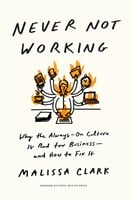Never Not Working: Why the Always-On Culture Is Bad for Business—And How to Fix It
February 26, 2024
If technology has made it easier to work more effectively, why do so many still feel overwhelmed? To uncover the answers, Malissa Clark guides readers through the landscape of modern workaholism.
 Never Not Working: Why the Always-On Culture Is Bad for Business—And How to Fix It by Malissa Clark, Harvard Business Review Press
Never Not Working: Why the Always-On Culture Is Bad for Business—And How to Fix It by Malissa Clark, Harvard Business Review Press
Over this past Thanksgiving, I found myself in conversation with a relative of mine, catching him up on what I’d been doing for the past few years. When I told him about my jobs on campus at UW-Milwaukee and my packed course load, he seemed impressed and told me that my grandfather would have been impressed, too; he said my grandfather never felt like he was working unless he had at least three jobs. In a similar vein, I’ve heard stories about my grandfather on my father’s side working insane hours as an operations manager for a trucking company, smoking packs of cigarettes and drinking pots of coffee every day to get himself through it. And despite what seems like agonizingly stressful work, he’s fond of telling me that he loved being busy at work—it makes the time go by faster.
These stories represent classic (or old-fashioned, depending on who you ask) values when it comes to work: loyalty to one’s job, always keeping busy, and working hard as a means to impress bosses and move up in the world. Our society has changed drastically since our grandparents were working these kinds of jobs; technology has made it easier to get work done and the jobs we work today are often very different. We now have the means to work smarter, not harder, but it seems we’re working harder than ever.
In Never Not Working, Malissa Clark sets out to debunk myths about workaholism, explain cultural factors that reinforce and encourage workaholic expectations, and outline solutions on both an individual and societal level. An associate professor of industrial and organizational psychology at the University of Georgia, Clark brings expert, thorough research to the table, as well as stories from interviews with nearly a hundred people who consider themselves workaholics, are partnered with workaholics, or study workaholism.
The resulting book is a comprehensive portrait of the American workaholic. This person may work 60-plus hour weeks when only 40 is expected, send emails to their boss at 2 a.m., work through vacations and weekends, miss their children’s soccer games, schedule cancer treatments around their work schedule, and suffer from health issues ranging from anxiety and depression to weakened immune system response and stress-induced heart disease. Clark notes that nearly half of American workers consider themselves workaholics, and that the number is higher for Millennials. Extreme overwork is not a thing of the past and, in fact, rapid technological advancements over the past decades have made it harder to disconnect, blurring the lines between home and work.
A former workaholic herself, Clark begins with her own experience as someone who worked compulsively and understands that it's genuinely difficult for many workaholics to recognize that they have a real problem. It’s equally difficult to tackle such a pervasive addiction, particularly when it’s encouraged by a capitalistic society that rewards overwork with promotions and raises. When your brain screams at you to continue working and your company rewards those who work the most (and not necessarily the most effectively), it feels impossible to even consider the idea of disconnecting and living life outside of work. Making changes to one’s work life is essential, however, to preserve one’s relationships, health, and even work performance; one of the first things Clark does is show that workaholics actually do not get more work done than the average worker, and in fact, the health issues and burnout that overwork causes can be a liability to one’s company.
I consider myself lucky to have read this book when I did. I keep coming back to the book’s index, which includes a Multidimensional Workaholic Scale and a set of questions from Workaholics Anonymous. My score—a 39 on a scale of 80—wasn’t necessarily damning, but it has prompted me to take a deeper look at my attitudes towards work. Since reading, I’ve started taking more deliberate breaks. I’ve taken the time to take it easy. I’m working on rethinking my priorities, figuring out what’s actually a matter of life and death (and turns out, it’s not the German essay I’ve been agonizing over for days).
Half of American workers already consider themselves workaholics, and it’s possible even more may have some workaholic tendencies; even if you don’t think that’s you, it’s likely someone you love. Never Not Working is representative of the wealth of knowledge and resources we now have when it comes to the issue of overwork—it's worth it to take a second look and reflect on the symptoms our workaholic society has conditioned you to ignore.



